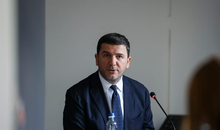
 Flash News
Flash News
Accident at "Shkalla e Tujanit", truck overturns in the middle of the road, driver injured
Vlora by-pass, work delays and cost increases
Milan are expected to give up on the transfer of Granit Xhaka
Inceneratori jashtë funksionit, përfshihet nga flakët fusha e mbetjeve në Elbasan
Accident on the Lezhë-Shëngjin axis, one injured
Meet Kozeta Miliku, named one of the top five scientists in Canada

The prestigious Globe and Mail magazine has selected five female scientists in Canada who have made significant advances in health, science and medicine.
It also includes an Albanian, Kozeta Miliku (clinical epidemiology, early life exposures, ultra-processed foods, obesity).
Who is Kozeta Miliku?
Growing up in Albania, one of Kozeta Miliku’s favorite games was playing doctor, with her cousin taking on the role of pharmacist. With the help of a neighbor—a real pharmacist—who would give them empty medicine bottles, they would spend many hours playing this imaginary game. “I always dreamed of becoming a doctor,” she says. “I wanted to save people.”
She later went to medical school, but toward the end of her residency, she realized that many diseases are preventable.
“I often saw the consequences of chronic diseases, but what I became increasingly interested in were the causes that occur earlier,” she says. “I wanted to understand how early exposure, even before birth, affects health throughout life.”
Dr. Miliku moved into the field of clinical epidemiology and today, at 37, is an assistant professor in the Department of Food Sciences at the University of Toronto, where she directs a lab that studies factors that influence long-term health.
Her research has uncovered troubling facts, such as that 3-year-old Canadian children get nearly half of their daily calories from highly processed foods – putting them at risk for obesity.
This year, she published a study that found that children born to fathers who are obese or overweight at the time of conception are more likely to develop obesity.
Her research is based largely on data from the CHILD study – the research initiative that brought her to Canada and where she currently serves as clinical science officer.
Since 2009, CHILD researchers have followed thousands of children from birth, collecting information on their health and physical samples at various stages – from babies’ blood and stool to indoor dust. The result is a robust database that has produced over 200 published scientific articles.
“It’s a world-renowned research initiative,” she says. “A fantastic study, one of the largest we have in Canada.”
After graduating from the Medical University of Tirana in 2013, she went to the Netherlands to pursue her master’s and doctorate degrees at Erasmus University Medical Center, where she worked on the Generation R study.
She was fascinated by breastfeeding, especially its positive impact on kidney development. “I couldn’t sleep,” she says. “I was wondering: what is it in breast milk that brings these health benefits?”
She searched for breast milk experts, and the first name she found was Meghan Azad—a lecturer at the University of Manitoba and deputy director of CHILD. She immediately sent her an email, and they connected the next day. “She said, ‘Will you work as a postdoctoral researcher in my lab?’” she recalls with a laugh. “It happened very quickly.”
After moving to Manitoba in 2017, she worked with Azad to continue the study on breast milk, investigating components that might protect against childhood asthma and allergies. Three years later, she was called to McMaster University — CHILD’s national collaborating center — where she was named the study’s clinical science officer.
In this role, she designs protocols for well-child visits and consults with CHILD’s extensive network of experts to decide what data to collect and what research questions to pursue.
Dr. Miliku says CHILD researchers want to empower participants, which has helped the study maintain a high level of participation — even during the pandemic. Last summer, CHILD asked some of the participating teens what they would like the researchers to focus on. “They said mental health — which wasn’t a key focus of the study at first,” she says. “But now we’re putting a lot of emphasis on mental health.”
Although she has a long career ahead of her, she hopes that by the time she reaches the end of her career, she will have fulfilled her childhood goal – to save people by stopping diseases before they develop.
“My goal is to improve the health and well-being of Canadian families through prevention in the early stages of life,” she says. “Before problems arise.”
Latest news








Golem and Qerret without water at the peak of the tourist season
2025-07-01 21:09:32

Euractiv: Italy-Albania migrant deal faces biggest legal challenge yet
2025-07-01 20:53:38
BIRN: Brataj and Fevziu victims of a 'deepfake' on Facebook
2025-07-01 20:44:00

Vlora by-pass, work delays and cost increases
2025-07-01 20:24:29



Milan are expected to give up on the transfer of Granit Xhaka
2025-07-01 19:41:25


The silent but rapid fading of the towers' euphoria
2025-07-01 18:58:07
Donald Trump's daughter says 'goodbye' to June with photos from Vlora
2025-07-01 18:48:47

Tirana vote recount, Alimehmeti: CEC defended manipulation
2025-07-01 18:15:05

Left Flamurtari, striker signs with another Albanian club
2025-07-01 17:43:14
Accident on the Lezhë-Shëngjin axis, one injured
2025-07-01 17:19:35
June temperature records, Italy limits outdoor work
2025-07-01 17:03:15

Meet Kozeta Miliku, named one of the top five scientists in Canada
2025-07-01 16:32:12
"Arsonist" arrested for repeatedly setting fires in Vlora (NAME)
2025-07-01 16:29:45

The ecological integrity of the Vjosa River risks remaining on paper
2025-07-01 16:09:40
Heat Headache/ Causes, Symptoms and Measures You Should Take
2025-07-01 16:01:13
UN: The world must learn to live with heat waves
2025-07-01 15:54:50

Three cars collide in Tirana, one of them catches fire
2025-07-01 15:38:16

Shehu: Whoever doesn't want Berisha, doesn't want the opposition 'war'!
2025-07-01 15:19:20
Berisha requests the OSCE Assembly: Help my nation vote freely
2025-07-01 15:11:46
Be careful with medications: Some of them can harm your sex life
2025-07-01 15:00:32

'Golden Bullet'/ Lawyers leave the courtroom, Altin Ndoc's trial postponed again
2025-07-01 14:44:52
EU changes leadership, Kosovo in a number of places
2025-07-01 14:40:01
Should we drink a lot of water? Experts are surprised: You risk hyponatremia
2025-07-01 14:30:20



Lëpusha beyond Rama's postcards: A village that is being silently abandoned
2025-07-01 13:41:56
Scorching temperatures in France close the Eiffel Tower
2025-07-01 13:29:35
Media: China, Iran and North Korea, a threat to European security
2025-07-01 13:20:12
Albania drops in global index: Less calm, more insecure
2025-07-01 13:09:35
Road collapses, 5 villages in Martanesh risk being isolated
2025-07-01 13:03:04

Këlliçi: Opposition action to be decided in September
2025-07-01 12:48:49
Four tips for coping with the heat wave
2025-07-01 12:38:53
Car hits pedestrian on Transbalkan road
2025-07-01 12:27:09
Authors of 9 robberies, Erjon Sopoti and Abdullah Zyberi arrested
2025-07-01 12:15:56

He abused his minor daughter, this is a 36-year-old man in custody in Fier
2025-07-01 11:50:34
The constitution of the Kosovo Assembly fails for the 40th time
2025-07-01 11:40:08




EU confirms support for the Western Balkans
2025-07-01 10:50:45
Serious in Fier! Father sexually abuses his minor daughter
2025-07-01 10:32:33
One year since the passing of the colossus of Albanian literature, Ismail Kadare
2025-07-01 10:25:26


They supplied the 'spaçators' with drugs, two young men are arrested in Tirana
2025-07-01 09:54:09
Europe is "scorching", how dangerous are high temperatures?
2025-07-01 09:48:56


Nigel Farage in Albania: but why?
2025-07-01 09:13:12
Xama: The "Partizani" dossier is quite weak and without facts!
2025-07-01 09:04:47

Foreign exchange, the rate at which foreign currencies are sold and bought
2025-07-01 08:35:39
Fabricators again warn of factory closures and job cuts
2025-07-01 08:21:30
Horoscope, what do the stars have in store for you today?
2025-07-01 08:08:59
Scorching hot, temperatures reaching 40°C
2025-07-01 07:57:12
Morning Post/ In 2 lines: What mattered yesterday in Albania
2025-07-01 07:42:59
Recount after May 11, Braho: I had no expectations for massive vote trafficking
2025-06-30 22:54:18

Second hearing on the protected areas law, Zhupa: Unconstitutional and dangerous
2025-06-30 22:18:46



Israel-Iran conflict, Bushati: Albanians should be concerned
2025-06-30 21:32:42

Fuga: Journalism in Albania today in severe crisis
2025-06-30 21:07:11
"There is no room for panic"/ Moore: Serbia does not dare to attack Kosovo!
2025-06-30 20:49:53

Temperatures above 40 degrees, France closes nuclear plants and schools
2025-06-30 20:28:42
Lavrov: NATO is risking self-destruction with new military budget
2025-06-30 20:13:54
Turkey against the "Bektashi state" in Albania: Give up this idea!
2025-06-30 20:03:24

Accused of sexual abuse, producer Diddy awaits court decision
2025-06-30 19:40:44


